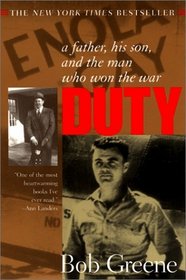Helpful Score: 2
Bob Greene is an accomplished human-interest writer, and this book is a splendid example of his work. My impression of this book was that it could be broken down into 3 parts: (1) A heartbreaking account of his father's slow demise. (2) A rendition of the audiotapes that his father, a World War II veteran, left for him that detailed his youth and wartime experiences. (3) Green's interviews of Gen. Paul Tibbets, USAF (Ret), who piloted the "Enola Gay" bomber (named after his mother) that dropped the first atomic bomb on Hiroshima. The book gives the reader amazing insights into the minds of the so-called "Greatest Generation" (Great Depression/WW II era) that you would be hard-pressed to find anywhere else. It is a fascinating and very readable book.
When Bob Greene went home to central Ohio to be with his dying father, it set off a chain of events that led him to knowing his dad in a way he never had before -- thanks to a quiet man who lived just a few miles away, a man who had changed the history of the world.
Greene's father -- a soldier with an infantry division in World War II -- often spoke of seeing the man around town. All but anonymous even in his own city, carefully maintaining his privacy, this man, Greene's father would point out to him, had "won the war." He was Paul Tibbets. At the age of twenty-nine, at the request of his country, Tibbets assembled a secret team of 1,800 American soldiers to carry out the single most violent act in the history of mankind. In 1945 Tibbets piloted a plane -- which he called Enola Gay, after his mother -- to the Japanese city of Hiroshima, where he dropped the atomic bomb.
On the morning after the last meal he ever ate with his father, Greene went to meet Tibbets. What developed was an unlikely friendship that allowed Greene to discover things about his father, and his father's generation of soldiers, that he never fully understood before.
Duty is the story of three lives connected by history, proximity, and blood; indeed, it is many stories, intimate and achingly personal as well as deeply historic. In one soldier's memory of a mission that transformed the world -- and in a son's last attempt to grasp his father's ingrained sense of honor and duty -- lies a powerful tribute to the ordinary heroes of an extraordinary time in American life.
What Greene came away with is found history and found poetry -- a profoundly moving work that offers a vividly new perspective on responsibility, empathy, and love. It is an exploration of and response to the concept of duty as it once was and always should be: quiet and from the heart. On every page you can hear the whisper of a generation and its children bidding each other farewell.
Greene's father -- a soldier with an infantry division in World War II -- often spoke of seeing the man around town. All but anonymous even in his own city, carefully maintaining his privacy, this man, Greene's father would point out to him, had "won the war." He was Paul Tibbets. At the age of twenty-nine, at the request of his country, Tibbets assembled a secret team of 1,800 American soldiers to carry out the single most violent act in the history of mankind. In 1945 Tibbets piloted a plane -- which he called Enola Gay, after his mother -- to the Japanese city of Hiroshima, where he dropped the atomic bomb.
On the morning after the last meal he ever ate with his father, Greene went to meet Tibbets. What developed was an unlikely friendship that allowed Greene to discover things about his father, and his father's generation of soldiers, that he never fully understood before.
Duty is the story of three lives connected by history, proximity, and blood; indeed, it is many stories, intimate and achingly personal as well as deeply historic. In one soldier's memory of a mission that transformed the world -- and in a son's last attempt to grasp his father's ingrained sense of honor and duty -- lies a powerful tribute to the ordinary heroes of an extraordinary time in American life.
What Greene came away with is found history and found poetry -- a profoundly moving work that offers a vividly new perspective on responsibility, empathy, and love. It is an exploration of and response to the concept of duty as it once was and always should be: quiet and from the heart. On every page you can hear the whisper of a generation and its children bidding each other farewell.
Barbara C. (kewl) reviewed Duty: A Father, His Son, and the Man Who Won the War on + 469 more book reviews
Green delineates one of the most significant cultural divides in America--between the deeply dutiful World War II generation and its more cynical and radically individualistic descendents. NY TIMES
Jojo E. (jaycoop) reviewed Duty: A Father, His Son, and the Man Who Won the War on + 4 more book reviews
I loved reading this book. It helped me connect with my father's generation, and helped me to get a better understanding of that time period.
Tony S. (flashnm) reviewed Duty: A Father, His Son, and the Man Who Won the War on + 5 more book reviews
Really enjoyed the book and how it distinguishes how different the generations are. Also enjoyed learning about Tibbets as well as greens dad whose ilk was much like Tibbets. Tibbets and his 2 living crew members sounded like a fun bunch to hang out with as Green got to do during their reunion in Branson Missouri. Tibbets and his crew were proud of their accomplishment and knew they did the right thing.




